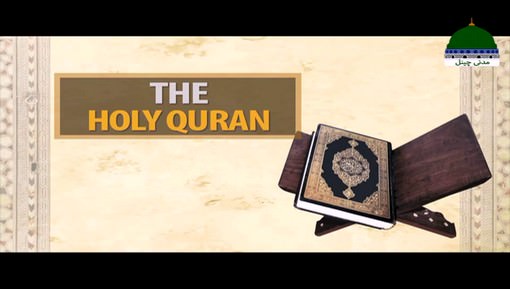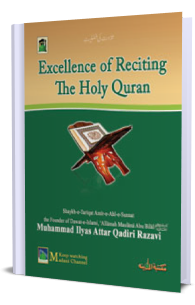A Heartfelt Plea
Reflect on the Holy Quran
The esteemed Follower, Sayyidunā al-Aḥnaf ibn Qays رَحْمَةُ الـلّٰـهِ عَـلَيْـه was once sitting when this Quranic verse crossed his mind:
لَقَدْ اَنْزَلْنَاۤ اِلَیْكُمْ كِتٰبًا فِیْهِ ذِكْرُكُمْؕ-اَفَلَا تَعْقِلُوْنَ۠(۱۰)
“We have indeed sent down towards you a Book, ˹O people of Quraysh˺, in which is your ˹potential˺ glorification; do you not have sense?”[1]
This made him attentive and vigilant, and he began to say, “It is necessary for me today to look into the Holy Quran to see how I have been mentioned. I wish to become aware of who I am with, and which people I resemble in my deeds and actions.”
He then opened the Holy Quran, and his vision paused at this verse:
كَانُوْا قَلِیْلًا مِّنَ الَّیْلِ مَا یَهْجَعُوْنَ(۱۷) وَ بِالْاَسْحَارِ هُمْ یَسْتَغْفِرُوْنَ(۱۸) وَ فِیْۤ اَمْوَالِهِمْ حَقٌّ لِّلسَّآىٕلِ وَ الْمَحْرُوْمِ(۱۹)
“They would sleep less during the night. And would seek forgiveness in the latter part of the night. And in their wealth, there was the right of the beggar and the deprived.”[2]
He then saw the mention of another nation, in another verse:
تَتَجَافٰى جُنُوْبُهُمْ عَنِ الْمَضَاجِعِ یَدْعُوْنَ رَبَّهُمْ خَوْفًا وَّ طَمَعًا٘-وَّ مِمَّا رَزَقْنٰهُمْ یُنْفِقُوْنَ(۱۶)
“Their sides become detached from their beds, and they call upon their Lord, fearing and hoping, and they donate some from what We have provided them.”[3]
Reading further about the pious, he momentarily paused and humbly supplicated, “O Allah! I do not consider myself from these individuals!” He began searching further in the Holy Quran, and he saw mention of a certain group of people:
وَ اِذَا ذُكِرَ اللّٰهُ وَحْدَهُ اشْمَاَزَّتْ قُلُوْبُ الَّذِیْنَ لَا یُؤْمِنُوْنَ بِالْاٰخِرَةِۚ-وَ اِذَا ذُكِرَ الَّذِیْنَ مِنْ دُوْنِهٖۤ اِذَا هُمْ یَسْتَبْشِرُوْنَ(۴۵)
“And when One Allah is mentioned, the hearts of those who do not believe in the Hereafter become diminished ˹with resentment˺. And when those other than Him (i.e., false deities) are mentioned, they rejoice.”[4]
He then read about the disobedient people, who will be thrown into Hell, and the people of Paradise asking them:
مَا سَلَكَكُمْ فِیْ سَقَرَ(۴۲) قَالُوْا لَمْ نَكُ مِنَ الْمُصَلِّیْنَۙ(۴۳) وَ لَمْ نَكُ نُطْعِمُ الْمِسْكِیْنَۙ(۴۴) وَ كُنَّا نَخُوْضُ مَعَ الْخَآىٕضِیْنَۙ(۴۵) وَ كُنَّا نُكَذِّبُ بِیَوْمِ الدِّیْنِۙ(۴۶) حَتّٰۤى اَتٰىنَا الْیَقِیْنُؕ(۴۷)
“’What took you into Hell?’ They said, ‘We never used to offer Salah nor feed the needy;
we indulged in evil speculations with evil thinkers; and we kept belying the Day of Justice until death overtook us.'”[5]
Sayyidunā al-Aḥnaf ibn Qays رَحْمَةُ الـلّٰـهِ عَـلَيْـه paused again and pleaded, “O Allah! I take refuge in You from these people! I have nothing to do with them.” After this, he began perusing the Holy Quran, searching for something about himself. He eventually reached the following verse:
وَ اٰخَرُوْنَ اعْتَرَفُوْا بِذُنُوْبِهِمْ خَلَطُوْا عَمَلًا صَالِحًا وَّ اٰخَرَ سَیِّئًاؕ-عَسَى اللّٰهُ اَنْ یَّتُوْبَ عَلَیْهِمْؕ-اِنَّ اللّٰهَ غَفُوْرٌ رَّحِیْمٌ(۱۰۲)
“And there are others who confessed their sins and mixed a good deed which another ˹which is˺ evil; it is imminent that Allah will accept their repentance. Surely, Allah is Most Forgiving, Ever Merciful.”[6]
Yet again, he paused for a moment, until he began saying uncontrollably: “O Allah! These are the people,” i.e., these are the people I match.[7]
The deep attachment our pious predecessors had to the Holy Quran is truly remarkable. Their uniquely reflective recitation of it is even more intriguing. Like them, we too must focus our minds on the words of Allah Almighty and faithfully reflect on the wisdom of each letter.
It is vital to consider the virtuous deeds of the believers and the rewards commissioned for them in the Hereafter, as mentioned in the Holy Quran; do we remain engaged in these virtuous deeds? Are we accumulating unimaginable reward for our eternal lives in the Hereafter, or are we instead burdening ourselves with sin and transgression?
It is important to study and avoid the actions of disobedient people. Do we find ourself indulging in these actions? Evidently, we must develop an understanding of the Holy Quran, if we are to draw meaning from its verses and reflect upon them. To do this, we must be aware of correct translations and exegeses of the Holy Quran.
A towering figure and Imam of spiritual wayfaring (taṣawwuf), Imam Abū Ṭālib al-Makkī رَحْمَةُ الـلّٰـهِ عَـلَيْـه states:
قَدْ اُمِرْنَا بِطَلْبِ فَهْمِ الْقُرْآنِ كَمَا اُمِرْنَا بِتِلَاوَتِه
“We have been instructed to understand the Holy Quran as much as we have been instructed to recite it.”[8]
One right of the Holy Quran upon the Muslims
It is a right of the Holy Quran upon the Muslims, that they must understand and reflect upon it. Allah Almighty states:
اِنَّاۤ اَنْزَلْنٰهُ قُرْءٰنًا عَرَبِیًّا لَّعَلَّكُمْ تَعْقِلُوْنَ(۲)
“Indeed, We have sent it down as an Arabic Quran; that you may understand.”[9]
This holy verse reveals that the Muslims should strive to understand the Holy Quran. As the Quran was revealed in Arabic, strong knowledge of Arabic is essential to accurately understand it and grasp its nuances. Those who do not know Arabic should consult reliable translations and commentaries by Sunni scholars. In this way, everyone may benefit from understanding and reflecting upon the Holy Qurʾān.[10] Allah Almighty states when referring to the revelation of the Holy Quran:
كِتٰبٌ اَنْزَلْنٰهُ اِلَیْكَ مُبٰرَكٌ لِّیَدَّبَّرُوْۤا اٰیٰتِهٖ وَ لِیَتَذَكَّرَ اُولُوا الْاَلْبَابِ(۲۹)
“This is a Book which We have sent down upon you, a blessed one, so that they (people) should ponder on its verses, and the people of intellect should accept advice ˹from it˺.”[11]
The example of those who read the Quran with Tafseer, and those who don’t
Sayyidunā Iyās ibn Muʿāwiya رَحْمَةُ الـلّٰـهِ عَـلَيْـه, who was from the Followers, said:
The example of those who recite the Holy Quran but do not know its meanings is the same as those who receive a letter from their king at night but do not have a lamp by which to read it. Not being able to read the contents of the letter, they then become fearful as to what it may contain. The example of those who recite the Holy Quran and know its Tafseer, is like those to whom a messenger came with a lamp in his possession. With this lamp, they were able to read the letter’s content and understand it. [12]
How should we reflect upon the verses of the Holy Quran?
Reading into and reflecting on the verses of the Holy Quran is a lofty act of worship. It is clear, however, that our reflection must be guided by the teachings of the Messenger of Allah صَلَّى الـلّٰـهُ عَلَيْهِ وَاٰلِهٖ وَسَلَّم—the original recipient of the Quran—his honourable Companions رَضِىَ الـلّٰـهُ عَـنْهُم, and their direct students, the Followers رحمۃُ الـلّٰـهِ علیہم.
The Messenger of Allah صَلَّى الـلّٰـهُ عَلَيْهِ وَاٰلِهٖ وَسَلَّم is he upon whom the Holy Quran was revealed, and the honourable Companions رَضِىَ الـلّٰـهُ عَـنْهُم were those who saw revelation occurring with their own blessed eyes. We must avoid any form of reflecting or contemplation upon the Holy Quran which is against their teachings and prescribed methods.
With thousands of Ulema guiding us through 1400 years of rigorous scholarship, Muslims are in no need whatsoever of uninformed, modernist musings on the Quran. It is arrogant and embarrassing that these revisionists think they have a monopoly on the true knowledge of the Holy Quran and disregard over a millennium of scholarly research and contributions in favour of their idiosyncratic, shallow reflections. Such people are certainly misguided.[13]
It is a plea to every faithful follower of the Messenger صَلَّى الـلّٰـهُ عَلَيْهِ وَاٰلِهٖ وَسَلَّم! Recite the holy words of your Lord, especially in this blessed month. It is time to fulfil the right of the Holy Quran to be recited, understood, and explored. Read its reliable translations and exegeses such as Ṣirāṭ al-Jinān, Khazāʾin al-ʿIrfān, and Nūr al-ʿIrfān.
In this blessed month, may Allah Almighty bless us with the honour of reciting, understanding, and acting on the Holy Quran, not only in Ramadan-ul-Mubarak but for the rest of our lives.
اٰمِیْن بِجَاہِ النَّبِیِّ الْاَمِیْن صَلَّی اللہ تَعَالٰی عَلَیْہِ وَاٰلہٖ وَسَلَّم
[1] [Kanz-ul-Iman (translation of Quran)] (Part 17, Surah Ambiya, verse 10)
[2] [Kanz-ul-Iman (translation of Quran)] (Part 26, Surah Al-Zariyaat, verses 17 - 19)
[3] [Kanz-ul-Iman (translation of Quran)] (Part 21, Surah Al- Sajdah, verse 16)
[4] [Kanz-ul-Iman (translation of Quran)] (Part 24, Surah Al- Zumar, verse 45)
[5] [Kanz-ul-Iman (translation of Quran)] (Part 29, Surah Al- Muddassir, verses 42 - 47)
[6] [Kanz-ul-Iman (translation of Quran)] (Part 10, Surah Al- Taubah, verse 102)
[7] Mukhtasar Qiyam al-Layl wa Qiyam Ramadan wa Kitab al-Witr, vol 1, page 42
[8] Qut ul Quloob, vol. 1, p. 104
[9] [Kanz-ul-Iman (translation of Quran)] (Part 12, Surah Yusuf, verse 2)
[10] Sirat ul Jinaan, vol. 4, p. 522
[11][Kanz-ul-Iman (translation of Quran)] (Part 23, Surah Saad, verse 29)
[12] Tafseer Qurtubi, vol. 1, p. 41
[13] Sirat ul Jinaan, vol. 2, p. 258


















Comments